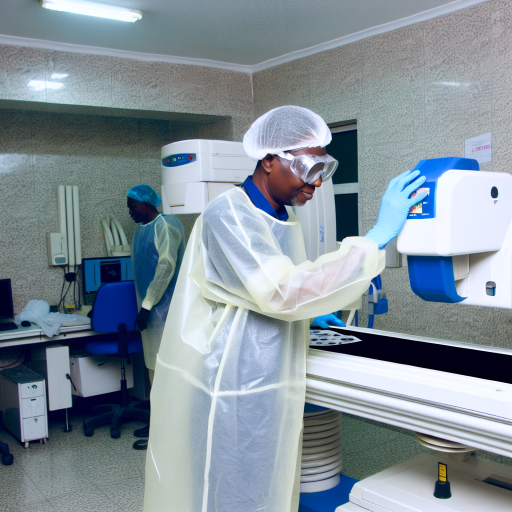Introduction
Nigeria faces numerous healthcare challenges that significantly impact its population.
Limited access to quality care hampers the well-being of millions.
High rates of infectious diseases and maternal mortality further strain the system.
Additionally, inadequate healthcare infrastructure poses another critical obstacle.
As a result, many citizens lack timely and effective medical interventions.
Emergency medicine represents a crucial branch of healthcare.
It involves the diagnosis and treatment of acute illnesses and injuries.
Emergency care provides life-saving interventions and stabilizes patients quickly.
Effective emergency medicine can mean the difference between life and death.
This specialty addresses urgent health issues ranging from trauma to cardiac arrest.
Discussing emergency medicine is vital for Nigeria’s healthcare future.
With an increasing population, the demand for emergency services grows exponentially.
Improving emergency care can alleviate pressure on overcrowded hospitals.
It can also reduce preventable deaths and complications stemming from delays in treatment.
Enhancing this sector can cultivate a more responsive and resilient healthcare system.
Incorporating a robust emergency medicine framework can lead to numerous benefits.
It can enhance the efficiency of existing health services.
Emergency departments can act as gateways to comprehensive healthcare.
By integrating emergency medicine, Nigeria can streamline patient flow and ensure timely interventions.
This approach can create a more effective healthcare continuum.
Furthermore, training and deploying skilled emergency staff can make a significant impact.
Adequate training equips healthcare workers to assess and manage critical situations.
By prioritizing this specialty, Nigeria can improve health outcomes at all community levels.
Emergency medicine fosters teamwork, quick assessment, and resource management.
In conclusion, emergency medicine is essential for Nigeria’s healthcare evolution.
Addressing immediate health crises not only improves individual outcomes but also strengthens the entire system.
Investing in emergency care will help Nigeria forge a healthier future for its citizens.
The State of Healthcare in Nigeria
Description of Nigeria’s Healthcare Infrastructure
Nigeria possesses a complex healthcare system.
The country operates a mix of public and private healthcare providers.
The public sector hosts the majority of healthcare facilities.
However, these facilities often struggle with inadequate funding.
Many government hospitals face overcrowding and poor management.
The private sector provides an essential alternative, but it is often inaccessible to low-income patients.
Healthcare infrastructure varies greatly by region.
Urban areas usually have better access to medical facilities.
In contrast, rural areas often lack essential services.
Many rural communities rely on local health centers with limited resources.
Nigeria has only one doctor for every 2,500 people.
This shortage creates significant challenges in providing timely and quality care.
Statistics on Healthcare Accessibility and Quality
The World Health Organization reports alarming statistics on healthcare in Nigeria.
Approximately 45% of the population lacks access to basic healthcare services.
Only 32% of births occur in medical facilities.
This statistic emphasizes the gap in maternal healthcare accessibility.
Healthcare quality appears inconsistent across the country.
The Nigerian Medical Association highlights significant issues.
Many healthcare workers lack essential training and resources.
Over 70% of hospitals do not meet international healthcare standards.
This lack of quality control can lead to misdiagnoses and higher mortality rates.
Moreover, Nigeria faces a high incidence of out-of-pocket expenditures.
Almost 75% of healthcare costs occur at the point of service.
This situation leads to catastrophic health expenditures for families, especially for those living below the poverty line.
Overview of Prevalent Health Issues and Emergencies Faced by the Population
Nigeria confronts a myriad of health challenges that directly affect public welfare.
Infectious diseases continue to pose serious challenges in Nigeria.
Malaria, tuberculosis, and HIV/AIDS plague the population.
- Malaria: Nigeria accounts for a significant percentage of global malaria cases.
- HIV/AIDS: Nearly 1.9 million Nigerians live with HIV/AIDS.
- Tuberculosis: Tuberculosis rates remain high, worsened by co-infections.
Childhood diseases such as measles and pneumonia are leading causes of child mortality.
Maternal mortality also remains critically high in Nigeria, one of the highest in the world.
Non-communicable diseases like diabetes and hypertension are on the rise.
These conditions require ongoing, specialized care, which is difficult to access.
Emergency situations exacerbate health challenges.
Accidents, injuries, and sudden crises demand immediate care, yet only 10% of Nigerians reach emergency facilities within an hour.
- Urban Areas: Traffic congestion delays access to hospitals.
- Rural Regions: Travel distances to healthcare facilities can take several hours.
This becomes life-threatening during emergencies when every second counts.
Healthcare workers face inadequate training and a lack of resources.
Emergency medical technicians and first responders often struggle to provide essential care.
The systemic challenges and prevalent health issues highlight the need for innovation in emergency medicine.
Addressing these gaps could drastically improve health outcomes.
Authorities must prioritize strengthening emergency care services.
Investment in training, resources, and infrastructure will improve access and quality of care.
A robust emergency medicine framework can address urgent health needs and strengthen resilience.
Nigeria’s healthcare system faces significant challenges.
However, with strategic investments, the country can improve healthcare access and quality, paving the way for a healthier future.
What is Emergency Medicine?
Emergency medicine is a branch of healthcare dedicated to the immediate assessment, diagnosis, and treatment of acute medical conditions.
This field of medicine addresses a wide range of health crises, ensuring timely interventions that can save lives.
The scope of emergency medicine is vast and involves various specialized practices that cater to urgent health needs.
Definition and Scope of Emergency Medicine
Emergency medicine involves the care of patients with acute and severe illnesses or injuries.
It focuses on providing immediate care to patients in life-threatening situations.
This medical specialty is crucial in promoting health, preventing complications, and decreasing mortality rates.
The scope encompasses several critical areas, including:
- Trauma care: Managing injuries from accidents or violence.
- Cardiac emergencies: Treating heart attack or cardiac arrest.
- Respiratory crises: Addressing severe asthma attacks or pneumonia.
- Neurological emergencies: Responding to strokes or severe headaches.
- Infection management: Treating severe infections or sepsis.
- Poisonings and overdoses: Immediate care for substance abuse situations.
- Pediatric emergencies: Specialized care for infants and children.
Key Components
Emergency medicine relies on several key components that enhance its effectiveness:
- Immediate assessment: Rapid evaluation of the patient’s condition is essential.
- Diagnosis: Accurate identification of the health issue allows for timely treatment.
- Treatment: Prompt medical intervention can stabilize patients and save lives.
These components form the foundation of emergency medical practices, ensuring that patients receive optimal care right from the moment they enter the system.
The Roles of Emergency Medical Services (EMS)
Emergency medical services play a vital role in the pre-hospital phase of patient care.
They provide immediate medical attention and efficient transport to healthcare facilities.
The responsibilities of EMS include:
- Assessing the patient’s condition at the scene.
- Providing basic or advanced life support as required.
- Transporting patients safely to emergency departments.
- Communicating patient information to hospital staff for effective handoff.
- Coordinating with other emergency responders such as police and fire services.
The presence and efficiency of EMS directly impact survival rates in emergencies.
Their training and readiness significantly enhance community health outcomes.
The Importance of Emergency Departments
Emergency departments (EDs) provide critical care for patients who require immediate attention.
These facilities are designed to handle a variety of urgent healthcare needs.
The functions of emergency departments include:
- Rapid patient triage to prioritize care based on the severity of conditions.
- Provision of diagnostic services such as imaging and laboratory tests.
- Administration of life-saving medications and procedures.
- Management of a wide range of medical emergencies.
- Collaboration with specialists for comprehensive patient care.
Emergency departments also play a critical role in public health.
They serve as essential access points for various health services, especially in underserved areas.
The Impact of Emergency Medicine in Nigeria
In Nigeria, emergency medicine is vital for improving overall healthcare delivery.
The nation faces various health challenges, including high rates of road traffic accidents and infectious diseases.
The need for well-established emergency medical services cannot be overstated.
Several factors highlight the significance of emergency medicine in Nigeria:
- Increasing population: A growing population leads to more health emergencies requiring prompt attention.
- Healthcare disparities: Many regions lack adequate healthcare resources, making emergency care essential.
- High morbidity and mortality rates: Effective emergency medicine can reduce these rates significantly.
- Response to public health crises: Effective emergency medicine plays a key role in managing epidemics and pandemics.
By investing in emergency medicine, Nigeria can address these recurring health challenges and improve the quality of care provided to its citizens.
Challenges and Solutions
Despite its importance, emergency medicine in Nigeria faces many challenges:
- Lack of trained emergency medical professionals.
- Inadequate infrastructure in emergency departments.
- Limited public awareness regarding emergency services.
- Transportation issues affecting timely access to care.
- Insufficient funding for emergency medical services.
Addressing these challenges requires a holistic approach:
- Investing in training programs for healthcare staff.
- Enhancing infrastructure to create efficient medical facilities.
- Increasing public awareness through education campaigns.
- Improving communication and transportation systems.
- Advocating for more government and private sector funding.
By tackling these issues, Nigeria can enhance its emergency medical system and provide better healthcare for all its citizens.
In conclusion, emergency medicine is absolutely critical to Nigeria’s healthcare future.
By prioritizing this medical specialty, the country can improve health outcomes, reduce mortality rates, and create a more robust healthcare system.
The commitment to enhancing emergency medical services will ensure a healthier, safer Nigeria for generations to come.
Read: Top Medical Disciplines Every Nigerian Student Should Consider
Current Challenges in Emergency Care in Nigeria
Emergency medicine plays a vital role in saving lives.
Unfortunately, Nigeria faces significant challenges in this field.
An analysis of emergency medical services reveals serious gaps in healthcare delivery.
These gaps hinder timely treatment and contribute to avoidable deaths.
Analysis of the Gaps in Emergency Medical Services
The lack of a robust emergency medical system affects all layers of healthcare in Nigeria.
The National Emergency Medical Services Policy, established in 2018, remains largely unimplemented.
Delays in response times are common, jeopardizing patient outcomes.
The existing emergency care systems are fragmented and poorly coordinated.
- Inadequate Infrastructure: Many emergency units lack basic facilities.
Equipment and medical supplies are often outdated or missing. - Poor Communication: Ineffective communication channels delay emergency response.
Locating patients and transferring them promptly becomes difficult. - Accessibility Issues: Many communities lack access to emergency services.
Rural areas are particularly underserved, leading to missed opportunities for timely care. - Insufficient Funding: Government funding for emergency medical services remains inadequate.
This lack of resources limits the availability of critical services.
Lack of Trained Professionals and Resources in Emergency Medicine
The healthcare workforce in Nigeria faces significant shortages.
Emergency medicine specialists are particularly scarce.
This shortage affects the quality of care provided to patients in critical situations.
- Limited Training Opportunities: Few medical schools in Nigeria offer specialized training in emergency medicine.
This results in a lack of skilled professionals. - High Burnout Rates: Existing emergency care providers often experience burnout.
Long hours and high pressure lead to high turnover rates among professionals. - Insufficient Resources: The lack of basic medical supplies and medications hampers emergency care.
Medical providers struggle to deliver quality services without necessary resources. - Inadequate Pre-hospital Care: The pre-hospital care system is underdeveloped.
Ambulance services are often outdated and poorly equipped.
Case Studies of Emergency Response Failures in Nigeria
Real-life case studies illustrate the urgent need for improvements in emergency care.
Analyzing these failures can provide insights into necessary reforms.
- The Lekki Tollgate Incident: The 2020 protest at Lekki Tollgate resulted in numerous injuries.
Emergency responders struggled to reach victims due to traffic and inadequate resources. - Multiple Road Traffic Accidents: Nationwide, road traffic accidents often lead to severe injuries.
Delays in response exacerbate injuries, leading to preventable deaths. - Inadequate Response to Disease Outbreaks: During outbreaks like Lassa fever, the emergency response system falters.
This gap results in poor management and increased mortality rates. - Hospital Overcrowding: Emergency departments often become overloaded during crises.
Overcrowding diminishes the quality of care available to all patients.
Efforts to enhance emergency medicine in Nigeria must address these challenges.
By focusing on comprehensive reforms, the nation can build a stronger healthcare system.
Investment in training and resources is vital for improving emergency care.
Enhanced public awareness can also lead to better health-seeking behaviors.
Transform Your Career with Expert Guidance
Get personalized mentorship consulting that’s tailored to your unique path. Our expert advice is actionable and exclusive.
Get StartedIn conclusion, recognizing and addressing these challenges is critical for Nigeria’s healthcare future.
Emergency medicine holds the potential to save lives and improve overall health.
Collaborative efforts from the government, healthcare professionals, and communities can create lasting change.
The time for action is now.
Through determination and strategic planning, Nigeria can transform its emergency care landscape to meet the needs of its citizens effectively.
Read: Overview of Telecommunication Engineering in Nigeria
The Impact of Robust Emergency Medicine on Public Health
Effective emergency medicine plays a crucial role in shaping public health outcomes in Nigeria.
It directly influences mortality and morbidity rates, affecting the lives of countless individuals.
A strong emergency medicine system can reduce the burden of diseases and injuries.
Here are several ways emergency medicine impacts public health:
- Reduction in Mortality Rates: Rapid response to medical emergencies saves lives.
Effective emergency departments (EDs) stabilize patients more quickly.
The chances of surviving critical conditions such as heart attacks and strokes increase significantly with timely intervention.
Research demonstrates that countries with well-structured emergency systems report lower mortality rates from such events. - Decrease in Morbidity Rates: Emergency medicine not only saves lives but also minimizes long-term disabilities.
Swift treatment can prevent complications and chronic health issues.
For instance, timely management of severe trauma can lead to better recovery outcomes.
This reduces the long-term healthcare costs associated with rehabilitation and chronic care.
The Role of Emergency Medicine in Managing Epidemics and Pandemics
In today’s interconnected world, epidemics and pandemics pose significant threats.
Emergency medicine acts as the frontline defense for outbreaks of infectious diseases.
Efficient emergency care systems enhance the ability to manage health crises effectively.
Here are some key contributions of emergency medicine during such events:
- Surveillance and Rapid Response: Emergency services help identify outbreaks early.
Health professionals in EDs monitor trends and patterns in patient presentations.
They alert public health authorities about new infections, enabling quicker containment measures. - Resource Allocation: Emergency medicine structures facilitate an organized response.
During an epidemic, hospitals can manage patient flow effectively.
They can prioritize treatment based on urgency and resource availability, ensuring optimal care for all. - Public Education: Emergency departments often serve as educational hubs.
Health professionals can provide crucial information about prevention and care.
They educate the public on when to seek help, thus improving health literacy and health-seeking behavior.
Importance of Timely Interventions and Access to Emergency Care
Timely interventions are fundamental in emergency medicine.
They determine patient outcomes and play a significant role in public health.
When individuals can access emergency care rapidly, the health system benefits in numerous ways:
- If care is not timely, conditions can worsen: Delays in treatment increase the risk of complications.
For instance, stroke patients lose 1.9 million neurons for every minute they don’t receive treatment.
Ensuring rapid access can prevent irreversible damage. - Access to Quaity Care: Well-equipped emergency departments offer specialized care.
Facilities that receive adequate funding can provide better resources and skilled personnel.
This access to quality care is vital for managing life-threatening conditions effectively. - Comprehensive Triage System: An efficient triage system prioritizes patients based on their urgency.
This process ensures that those in critical need receive attention first.
It prevents overcrowding and enhances the effectiveness of emergency services. - Community Resilience: Strong emergency medical services contribute to community health resilience.
A reliable system instills public confidence in healthcare.
When communities believe they will receive prompt care, people are more likely to use these services.
Investing in emergency medicine translates into societal gains.
It reduces the burden of disease on the healthcare system.
Every life saved contributes to the wellbeing of families, and healthier communities lead to economic growth.
The role of emergency medicine cannot be understated; it is a pillar of a robust healthcare infrastructure.
As Nigeria continues to face healthcare challenges, promoting a strong emergency medicine framework must be a priority.
Policymakers should allocate funds to improve emergency facilities and training.
Enhancing the capabilities of emergency medical services will undoubtedly yield long-term benefits.
From improving patient outcomes to managing public health crises, robust emergency medicine is critical for Nigeria’s healthcare future.
Read: Telecom Service Quality in Nigeria

Training and Development in Emergency Medicine
Emergency medicine plays a vital role in Nigeria’s healthcare system.
The success of this field relies heavily on training and development for healthcare providers.
Investing in education equips practitioners with the necessary skills to save lives.
Below, we explore the various training programs, emphasize the importance of specialized training, and discuss collaborations that enhance capacity building.
Overview of Training Programs for Emergency Healthcare Providers
Numerous training programs exist to prepare healthcare providers for emergency situations.
These programs aim to enhance knowledge, skills, and critical thinking abilities.
Here are some key training options available:
- Basic Life Support (BLS): This training teaches CPR and basic airway management.
It is essential for all healthcare providers. - Advanced Cardiac Life Support (ACLS): ACLS focuses on managing cardiac emergencies.
It covers the use of medications, defibrillation, and advanced airway techniques. - Pediatric Advanced Life Support (PALS): PALS concentrates on the emergency care of children.
It emphasizes recognition and intervention in pediatric emergencies. - Trauma Training Programs: These programs educate providers on handling trauma cases.
They include assessments, resuscitation techniques, and management strategies. - Emergency Medical Technician (EMT) Training: EMT courses prepare individuals for pre-hospital care.
This training focuses on patient assessment and urgent interventions.
Some institutions in Nigeria offer comprehensive training tailored to local needs.
These programs often include hands-on simulations, workshops, and clinical practice.
They bridge knowledge gaps and empower providers to deliver effective care.
Importance of Specialized Training and Continuous Education
Emergency medicine evolves rapidly with new guidelines, technologies, and protocols.
Specialized training holds critical importance in keeping healthcare providers updated.
Continuous education offers several benefits:
- Improved Patient Outcomes: Specialized training enhances clinical skills.
This leads to better diagnosis, treatment, and care for patients. - Increased Confidence: Ongoing education instills confidence in healthcare providers.
This confidence is essential for making quick decisions in emergencies. - Enhanced Teamwork: Training fosters collaboration among healthcare teams.
Effective communication improves the overall quality of emergency care. - Adaptability to New Challenges: Medical professionals learn to adapt to emerging trends.
Updated knowledge prepares them to face unexpected situations. - Compliance with Standards: Continuous training ensures adherence to international guidelines.
Providers can maintain high standards of care in line with global practices.
Many healthcare providers in Nigeria face obstacles in accessing continuous education.
Geographical barriers, limited resources, and financial challenges hinder participation.
Therefore, it is crucial to develop innovative solutions for overcoming these barriers.
Online courses, mobile training units, and community workshops can help expand access.
Collaboration with International Bodies for Capacity Building
Collaborations with international organizations strengthen training initiatives.
These partnerships provide resources, expertise, and guidance for developing local programs.
Some notable collaborations include:
- World Health Organization (WHO): The WHO provides technical assistance and guidelines for emergency care systems.
They support policy development and training initiatives. - International Committee of the Red Cross (ICRC): The ICRC focuses on humanitarian emergency response.
Their training programs enhance the skills of healthcare providers dealing with crises. - International Federation for Emergency Medicine (IFEM): IFEM facilitates the development of emergency medicine worldwide.
They promote research and education, influencing local training efforts. - Medecins Sans Frontieres (MSF): MSF provides emergency medical care in crisis situations.
They offer training that helps develop competencies in high-stress environments. - Regional Collaborations: Local training programs can engage in partnerships with neighboring countries.
These collaborations can share best practices and resources to elevate emergency medicine standards across the region.
Such collaborations enhance the capacity of healthcare systems in Nigeria.
By learning from international experiences, local practitioners can adopt best practices.
This improves the overall effectiveness of emergency medicine in addressing public health challenges.
In summary, the advancement of emergency medicine in Nigeria hinges on robust training and development.
Expanding access to specialized programs fosters competent healthcare providers.
Continuous education and international collaborations add significant value.
By investing in these areas, Nigeria can build a sustainable future for its healthcare system.
Emergency medicine will play a crucial role in reducing morbidity and mortality rates, benefiting all citizens.
Read: Course Outline: Toxicology in Nigerian Universities
Community Awareness and Education
Public awareness campaigns are vital for promoting emergency services in Nigeria.
These campaigns inform citizens about the importance of emergency medicine.
They help individuals understand when and how to seek emergency care.
This knowledge can reduce delays in treatment, which is crucial for improving patient outcomes.
The Role of Public Awareness Campaigns
Public awareness campaigns educate communities on various aspects of emergency medical services.
Here are some key components:
- Understanding the types of emergencies that require immediate attention.
- Learning how to contact emergency services effectively.
- Recognizing the signs and symptoms of critical health events, such as heart attacks and strokes.
- Emphasizing the importance of first aid and CPR training.
- Encouraging preventive measures to reduce the occurrence of emergencies.
Through engaging social media posts, flyers, and community workshops, awareness can spread.
Visual messaging can capture attention and convey information quickly.
By harnessing radio, television, or community centers, these campaigns can reach diverse audiences.
How Community Education Can Improve Patient Outcomes
Community education improves patient outcomes in several ways.
When individuals know when to seek care, they act quickly.
Faster responses can significantly increase survival rates.
Additionally, informed communities can provide the right information to emergency responders.
- Individuals learn basic first aid techniques to assist during emergencies.
- Communities understand the significance of keeping emergency contact numbers accessible.
- Educated citizens can reduce unnecessary emergency room visits.
- Awareness of local emergency service capabilities helps set realistic expectations.
- Knowledge about preventive health can lead to healthier lifestyle choices.
Public education can also reduce stigma around seeking help.
Many people avoid medical attention due to misconceptions or fear.
By educating communities, we can encourage individuals to prioritize their health.
Increased knowledge can foster a proactive attitude towards healthcare.
Strategies for Engaging the Public in Understanding Emergency Care Protocols
Engaging the public requires strategic planning.
Here are effective methods to involve communities:
- Organizing community workshops to teach emergency response skills.
- Partnering with schools to incorporate emergency medicine education into curricula.
- Using local influencers and leaders to promote awareness campaigns.
- Hosting simulation events that mimic real-life emergency situations.
- Creating informative content in local languages to reach wider audiences.
Innovative outreach methods can captivate and educate at the same time.
For instance, interactive mobile applications can facilitate learning.
These apps can provide easy access to information about emergency care.
They can also offer quizzes to reinforce knowledge and understanding.
Community events, like health fairs, can also spread awareness.
These fairs can feature free first aid training sessions and health screenings.
Such interactions encourage dialogue on emergency care topics.
The Importance of Collaboration
Collaboration between healthcare providers and communities lifts awareness initiatives.
Emergency services must work closely with local organizations.
These partnerships can broaden the reach of educational resources.
Together, we can address specific community needs effectively.
- Health workers can offer insights into local health trends and challenges.
- Community organizations can assist in disseminating information to vulnerable populations.
- Schools can integrate emergency preparedness education into their programs.
- Religious and community leaders can endorse health messages to their followers.
- Employers can encourage staff participation in emergency training programs.
By fostering these partnerships, we can enhance the quality of emergency care.
Additionally, informed and prepared communities can navigate healthcare emergencies more effectively.
Leveraging Technology for Education
Technology plays a crucial role in enhancing community awareness.
Social media platforms can serve as powerful tools for education.
They allow health organizations to reach large audiences quickly.
Engaging content can be shared widely, promoting discussions about emergency preparedness.
- Webinars can provide valuable information on emergency care topics.
- Online forums can create spaces for sharing experiences and advice.
- Mobile alerts can remind the public about emergency preparedness tips.
- Educational videos can demonstrate first aid techniques visually.
- Podcasts can feature discussions between healthcare professionals and community members.
By utilizing these technologies, we amplify our outreach efforts.
An informed public will understand the necessity of emergency services better.
Their engagement can foster a sense of community responsibility towards health and well-being.
In conclusion, community awareness and education are essential for strengthening emergency medicine in Nigeria.
Public understanding can significantly reduce response times and improve patient outcomes.
Through effective campaigns, community education, and strategic partnerships, we can empower individuals.
Informed citizens are better equipped for emergencies, thus enhancing the overall health system.
Building awareness requires commitment and collaboration.
Each stakeholder plays a critical role in promoting emergency care awareness.
By innovating our approaches and leveraging technology, we can create a safer and healthier society.
Integration of Emergency Medicine into Nigeria’s Healthcare System
Integrating emergency medicine into Nigeria’s healthcare system requires comprehensive policy reforms.
These reforms must prioritize accessible, efficient emergency medical services.
The current healthcare framework often lacks the necessary focus on emergency care.
As a result, many lives could be saved with improved systems in place.
One significant aspect of reform involves establishing a national emergency response framework.
This framework would promote standardization in emergency care across the country.
Policymakers must recognize the need for well-trained emergency personnel.
This includes doctors, nurses, and paramedics specially trained in emergency medicine.
Policy Reforms for Emergency Services
- Develop comprehensive emergency care policies at local and national levels.
- Create clear guidelines for emergency medical services operation and management.
- Implement training programs for healthcare professionals focused on emergency medicine.
- Incorporate emergency medicine into medical school curricula and continuing education courses.
- Establish emergency care units within hospitals to cater specifically to urgent cases.
- Ensure adequate funding for emergency services through government and donor support.
- Utilize data collection and analysis to improve emergency response times and patient outcomes.
These reforms must address existing gaps in emergency care access.
By prioritizing emergency medicine, Nigeria can enhance overall healthcare delivery.
Increased community awareness about emergency response can lead to better utilization of services.
Public education campaigns should focus on recognizing emergencies and activating the right response.
Public-Private Partnerships (PPPs)
Public-private partnerships play a crucial role in strengthening emergency medical services in Nigeria.
Collaboration allows for the pooling of resources and expertise.
Together, they can implement innovative solutions to address existing challenges.
- Develop training programs through private sector investments in education.
- Enhance the availability of modern emergency equipment through public-private funding.
- Create emergency response networks that leverage private sector logistics support.
- Utilize private healthcare facilities to expand service coverage in underserved areas.
- Engage community organizations in raising awareness about available emergency services.
- Promote accountability and efficiency in administering emergency medical services.
These partnerships can drive the adoption of best practices in emergency medicine.
Businesses can contribute resources, and governments can facilitate regulatory support.
By joining forces, public and private sectors can improve the quality of emergency care across Nigeria.
Long-term Vision for Emergency Medicine
A long-term vision for emergency medicine is essential within Nigeria’s national health strategy.
This vision should be comprehensive and adaptable to evolving health needs.
Integrating emergency services will require commitment from all stakeholders.
- Establish a dedicated national body to oversee emergency medical services.
- Set clearly defined goals for reducing emergency morbidity and mortality rates.
- Evaluate healthcare facilities’ readiness to manage emergency cases regularly.
- Promote research and development focusing on emergency health needs.
- Encourage community-based initiatives to promote emergency preparedness.
- Develop transport solutions to facilitate quick access to emergency services.
- Advocate for inclusion of emergency medicine in health insurance plans to increase accessibility.
This long-term vision should align with international best practices.
By investing in emergency medicine, Nigeria can save lives and improve health outcomes.
Emergency medical services serve as the backbone of any efficient healthcare system.
Hence, their integration and strengthening is pivotal for the nation’s healthcare future.
Conclusion
Emergency medicine plays a vital role in Nigeria’s healthcare landscape.
We have explored its significant impact on saving lives, improving health outcomes, and providing timely interventions.
Emergency services reduce mortality rates and enhance survival chances in critical situations.
Access to efficient emergency care enables better management of healthcare crises.
Investment in emergency medicine training elevates the skill level of healthcare professionals.
Equipping healthcare facilities with essential emergency medical supplies is crucial.
The stakeholders in the healthcare sector must prioritize emergency medical services.
Government policies should focus on increasing the availability and accessibility of these services.
Public awareness campaigns can also enhance community engagement with emergency care systems.
A strengthened focus on emergency medicine can lead to a healthier population.
Addressing the current gaps will foster resilience in emergency healthcare delivery.
Through collaboration, Nigeria can establish a robust emergency healthcare framework.
In conclusion, let us commit to enhancing emergency medicine in Nigeria.
By doing so, we can create a stronger, more responsive healthcare system.
This commitment will ensure a healthier future for all Nigerians.
Every effort counts toward a sustainable and effective emergency healthcare system.
Together, we can pave the way for significant improvements in the nation’s healthcare.
Let’s work towards a future where every life matters and emergencies are handled effectively.




